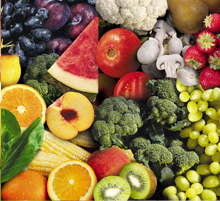Antioxidant vitamins
Vitamin E is found basically in nuts, green leaf vegetables, maize and oils; citruses, tomatoes and fruit and vegetables in general are a good source of vitamin C.
One of the better identified causes of the delay in the foetal growth in developed countries is the hypertensive diseases, mainly if they are accompanied by preeclampsia, being responsible of a third of all the delays in the foetal growth. Preeclampsia is a specific syndrome of the pregnancy that affects both the mother (by producing vascular alteration) and the foetus (causing a restriction of the intrauterine growth). Preeclampsia constitutes the first cause of maternal mortality in developed countries and it is also associated to an increase of the risk of premature childbirth and perinatal mortality.
Until the moment, it does not exist a treatment that prevents or delays the beginning of this disease. In the last few years, nevertheless, there have been excellent advances in the study of its causes, which brings us hopes on possible preventive interventions. Recent studies suggest that vascular alterations in preeclampsia are linked to an excess of production of free radicals or processes of oxidative stress. The free radicals are continuously being produced by the organism during the normal metabolism of the cells, as a reaction to an infection, or also as an answer to the exposure to ionizing radiations, ultra-violet rays, environmental pollution, cigarette smoke, or excess of exercise. The free oxygen radicals cause oxidative damage, that is considered to be the origin of several diseases, such as different types from cancer, cardiac and vascular diseases, neurological diabetes, ophthalmic pathology and ageing.
The chain reactions caused by the free radicals are only eliminated by the so-called defensive antioxidant systems, based fundamentally on antioxidant enzymes that try to prevent the production with highly reactive free radicals, and a second group of nonenzymatic antioxidant vitamins (vitamin C, vitamin E), that neutralizes the action of the free radicals already formed. When there is an imbalance between the production of free radicals and the antioxidant capacity of the organism, we can talk about processes of oxidative stress.
Those pregnant women with a diminished antioxidant capacity (or by deficient antioxidant vitamin ingestion, or by insufficient activity of their antioxidant enzymes), could more likely develop preeclampsia and have a premature children or with low weight at birth.
If there were sufficient evidence of a greater risk of preeclampsia and/or retardation of intrauterine growth in the pregnancies of those women with deficient antioxidant capacity in the initial phases of the pregnancy, a rich diet in these vitamins or the administration of antioxidant supplements could prevent or palliate the effects of these perinatal adverse conditions.
But we cannot forget that many environmental toxics produce damage in the organism through processes of oxidative stress. In addition to the possible beneficial effects of vitamins to prevent preeclampsia and to favour the foetal growth, a maternal and infantile diet rich in fruits and vegetables will make them less vulnerable to the possible environmental aggressions.

